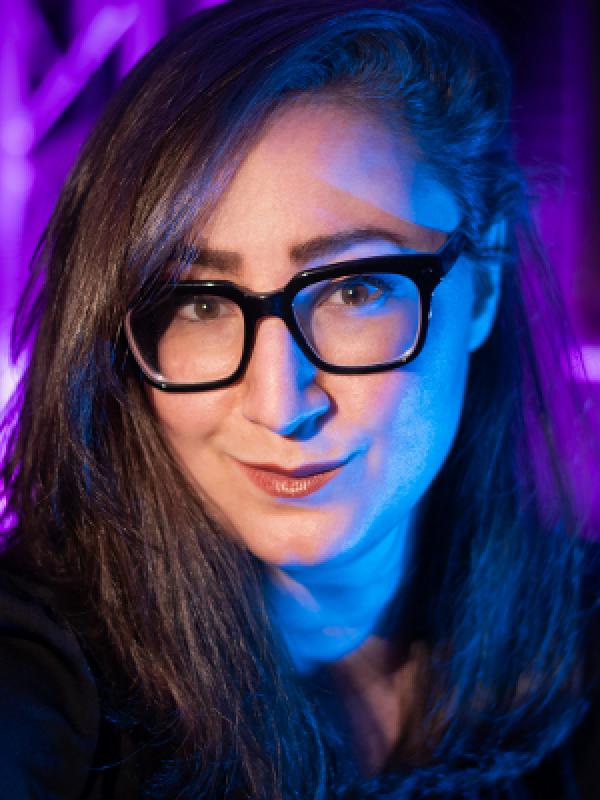Tina Tallon

Contact Information
Assistant Professor of Artificial Intelligence and Music Composition; Area Coordinator of Composition
Areas of Expertise
- Artificial Intelligence
- Music Composition
- Human Computer Interaction
- Installation Art
- Arts Documentation
- Voice Studies
- Music and Medicine
Education
- PhD (Music Composition), University of California–San Diego (2020)
- MFA (Music Composition and Theory), Brandeis University (2013)
- BS (Biological Engineering and Music), Massachusetts Institute of Technology (2011)
Winner of the 2021–2022 Frederic A. Juilliard/Walter Damrosch Rome Prize in Music Composition, Tina Tallon is a creative technologist, composer, engineer, and technocultural historian whose work focuses on the myriad ways in which artificial intelligence influences how artists engage with society, with a firm belief that artists can be agents of repairs in our increasingly technologically-mediated world. Dr. Tallon received her PhD in music composition from the University of California–San Diego (2020), where she explored the potential of electronic music as a reparative medium for engaging trauma. She currently serves as assistant professor of AI and Music Composition in The Ohio State University’s School of Music, where she was recently awarded Ohio State’s inaugural MKHSTRY Fellowship in recognition of her research into informed and responsible uses of AI to enhance outcomes in fields ranging from music education to medicine.
Her concert music and interactive installations have been widely performed and presented by ensembles such as the LA Philharmonic New Music Group, Ensemble Intercontemporain, wild Up, and Talea; in venues ranging from Disney Hall, the Venice Biennale, and major motion pictures, to leading AI conferences like NeurIPS. She has received numerous awards, grants and fellowships from organizations such as the Harvard Radcliffe Institute for Advanced Study, the American Academy in Rome, the Barlow Endowment, ASCAP, and the American Academy of Arts and Letters, among others. Recent commissioners include Lorelei Ensemble, VIVO Music Festival, the Peabody Institute of Johns Hopkins University, and the LA Philharmonic. Her collaborators have included particle physicists, visual artists, poets, dancers, biological engineers, filmmakers, birds, and jellyfish.
Some of Dr. Tallon’s current research interests include human-computer interaction, virtual tactility, embodied sonic cognition, algorithmic composition and procedural music generation, data sonification, computational musicology, labor, automation, intellectual property, and accessibility. Her work has been featured by The New Yorker, NPR, Politico, Science Friday, The New York Times and NBC; recent international public speaking appearances include the centenary in emerging technology at the 100th National Association of Schools of Music (NASM) Annual Meeting, a keynote at the 54th Congrès de L’Association Française D’Études Américaines (Dijon, France), two keynotes at the Iceland Airwaves PRO conference (Reykjavík) and the MIT-Grafenegg Forum (Austria). She has also served as an arts and technology entrepreneurship coach for MIT Bootcamps as well as a research affiliate in the MIT Department of Biological Engineering, where she developed engineering ethics curricula based on her work with technological partiality in voice technology and digital signal processing.
Recognizing the challenges posed by lack of access to sophisticated, nuanced and affordable documentation services for emerging and underrepresented artists, Dr. Tallon founded SALT Arts Documentation, an outfit that specializes in creating artistically-informed audiovisual documents of contemporary performing arts and training other artists in audio engineering, videography, photography and web design. She has worked with numerous nonprofits, arts groups and presenting organizations around the world; her media have been published by the New York Times, the Wall Street Journal, the LA Times, the Boston Globe, the San Diego Union-Tribune, and many others. She is also active as a vocalist, conductor, electronic musician and video artist, and has performed in and facilitated many productions around the globe. Prior to beginning her career as a musician, her research in pancreatic cancer won the Alexander J. Denner Funding Award from MIT, and she has developed computational tools to model both cancer metastasis and stem cell differentiation.
Prior to commencing her doctoral work at UC San Diego as a Katzin Prize fellow, Dr. Tallon completed BS degrees in Biological Engineering and Music from MIT (2011) and an MFA in Music Composition and Theory from Brandeis University (2013). Her primary composition teachers include Peter Child, David Rakowski and Lei Liang; and she has studied computer music with Miller Puckette and Tom Erbe. From 2020–2021, she was a Radcliffe Fellow at the Harvard Radcliffe Institute for Advanced Study, where she began work on her first evening-length multimedia opera and book on the technocultural history and future of voice technology. Prior to joining the faculty at The Ohio State University, she served as assistant professor of AI and the Arts in the University of Florida’s College of the Arts, where she was director of the Florida Electroacoustic Music Studios (FEMS) and affiliate faculty in the UF Informatics Institute. She has also held posts as assistant professor of Composition at the Boston Conservatory at Berklee, visiting assistant professor of Music at Clark University, and lecturer in Music and Theater Arts at MIT. She frequently appears as faculty at many festivals and summer programs, and currently serves as composition program co-director for the Cortona Sessions for New Music. A passionate educator, Dr. Tallon is committed to supporting young artists and engineers as they find their voices and dream up ways for their creative endeavors to make the world a better place.
